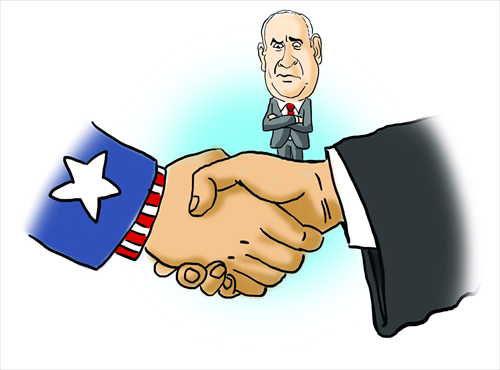Influence of Israel lobby declining in US, opening new possibilities

Illustration: Liu Rui/GT
Despite insistent protests by Israeli Prime Minister Benjamin Netanyahu, supported by both Democrats and Republicans in Congress, US President Barack Obama and his government are persisting in negotiations with Iran. Obama has the backing of a US majority unwilling to start another war in the Near East - and has at least half the American Jewish public behind him.
That is a severe blow to the claims of the leaders of most American Jewish organizations that they represent a community united in unequivocal solidarity with Israel. It is also a rebuke to those in Israel who define Jewishness as requiring that solidarity.
In fact, some of the most faithful allies of the Israeli government are in the 20 percent of Americans who adhere to Protestant Biblical literalism. They think that the foundation of the state of Israel is evidence for the imminence of the end of the world and God's final judgment - in which most Jews will perish but a selected group will elect Christianity.
They are joined by those with a variety of motives who think of Israel as an indispensable military ally of the US in an unending conflict with Islam.
The president, despite being frustrated in his larger project of a reconciliation with the Muslim peoples, has made a strategic choice. US material and moral resources are not to be expended on permanent enmity with Iran.
The current difficulties with Egypt, Turkey, Iraq, Pakistan and Afghanistan are burden enough. A military conflict between Iran and Israel would ignite a chain reaction in the Near East, the end of which would likely be persistent violence and economic and political chaos.
Once drawn in, the US would find an exit exceedingly difficult. The considerations which led the president to refrain from intervening in Syria - he prefers collaboration with Russia and the EU to contain the civil war - apply to the problems posed by Iran as well.
Historically, Israel was not always the client of the US it has become. In its founding wars with the Arab states, Israel obtained political support and weaponry from the Soviet Union. It was aided in developing nuclear arms by France, its military supplier in the war of 1956. Later, under the first Bush, there was a considerable rupture on account of Israel's invasion of Lebanon. The more compulsively Americans and Israelis affirmed an unbreakable relationship, the more influential segments of US diplomatic, intelligence and military apparatus retained and deepened their doubts.
The president chose to make public a long process of unannounced negotiation with Iran, confident that he has the support of the permanent government, the senior officials and military officers who manage US foreign policy.
Skepticism and opposition in Congress is mainly the work of those Republicans who inhabit an imaginary world in which US power is unchallenged. It was pointed out to them that if the US unilaterally withdraws from or blocks further negotiations with Iran, the other parties to the agreement - China, Russia, the EU - will abandon a sanctions regime about which they are in any case entirely unenthusiastic and in which in some cases - China and to a large degree Russia - they do not participate.
One critical element of potential resistance to the president has given way. The Jewish organizations, anxious to avoid the role of obedient servants of a foreign government and confronting the ambivalence, unease and opposition of a large segment of the American Jewish community, refused Netanyahu's demands that they oppose the president.
Their decision follows much debate, in and outside the Jewish community, over a survey by the reliable Pew Research Center, which suggests that a majority of American Jews do not consider Israel the center of their moral and political lives. They think of themselves as primarily US citizens concerned with the nation in which they live.
That poses problems the Jewish organizations cannot solve by repeating clichés about the common interests that unite Israel and the US. The Israel lobby's retreat in recent days is a very significant event - made possible by Obama's and Secretary of State John Kerry's ability to seize the occasion.
Does this mean, as some of the less sophisticated commentators say, a generalized US withdrawal from engagement abroad and in the Near East? That is a caricature.
The question the president has confronted is what sort of engagement best suits the US' national interest. He also has learned from the expenditure of trillions of dollars and the loss of thousands of our citizens that military interventions can cause more problems than they solve.
A process of rethinking has not only begun but is spreading through government and public. In time, it will even reach some of our more vociferous legislators. It is too early to predict its specific impact in other geopolitical regions, as in the Pacific area, but it is sure to have one. In other words, we are viewing an uncompleted picture.
The author is professor emeritus of Georgetown University Law Center. opinion@globaltimes.com.cn